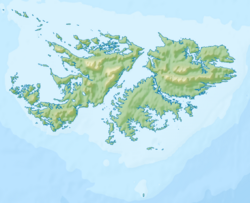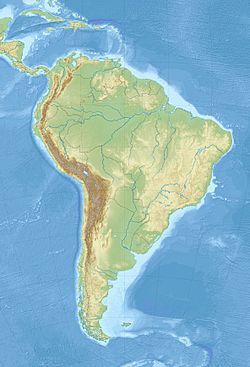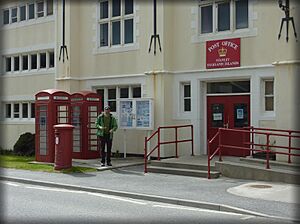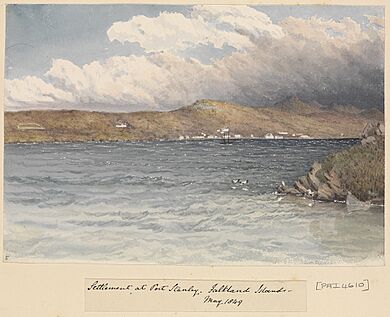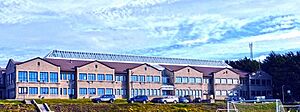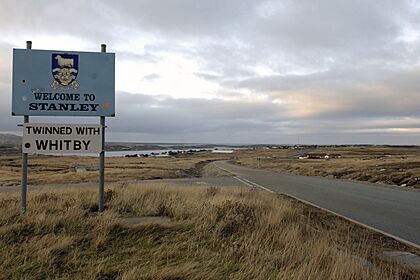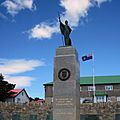Stanley, Falkland Islands facts for kids
Quick facts for kids
Stanley
|
|
|---|---|
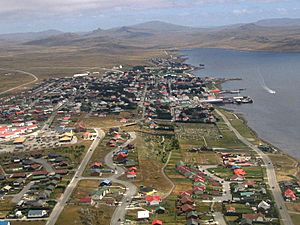
Aerial view of Stanley, Falkland Islands
|
|
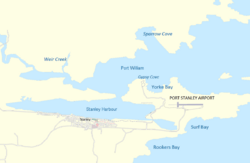
Map showing the Port Stanley area
|
|
| Sovereign state | |
| Territory | |
| Settlement established | 1843 |
| Made capital | July 1845 |
| Falklands war | 1982 |
| Awarded city status | June 2022 |
| Area | |
| • Total | 2.5 km2 (1.0 sq mi) |
| Population
(2016)
|
|
| • Total | 2,460 |
| • Density | 984/km2 (2,550/sq mi) |
| Time zone | UTC−3 (FKST) |
| Website | http://www.falklandislands.com/ |
Stanley, also known as Port Stanley, is the main city and capital of the Falkland Islands. It is located on the island of East Falkland. The city sits on a north-facing slope in one of the wettest parts of the islands. In 2016, about 2,460 people lived there. This was most of the Falkland Islands' total population of 3,398 people.
Stanley is represented by five of the eight elected members in the Legislative Assembly of the Falkland Islands. These members are Stacy Bragger, Barry Elsby, Mark Pollard, Roger Spink, and Leona Vidal Roberts. Stanley was officially given city status on June 14, 2022.
Contents
Exploring Stanley: What's There to See?
Stanley is the main place for shopping on the islands. It is also the center of the road network on East Falkland. There are many interesting places to visit. You can see the Falkland Islands Museum and Government House. Government House was built in 1845 and is where the Governor of the Falkland Islands lives.
The city also has a golf course and unique sights like a whale-bone arch. There is also a totem pole, several war memorials, and old shipwrecks in the harbor. The Falkland Islands Company owns many shops in Stanley. You can find four pubs, 11 hotels and guesthouses, and three restaurants. There is also a fish and chip shop and the main tourist office.
Churches and Community Places
Stanley has three churches. One is the Anglican Christ Church Cathedral. It is the southernmost Anglican cathedral in the world. There is also the Roman Catholic St. Mary's Church. A special unit in town helps to remove old bombs. This is a reminder of the Falklands War.
The town hall is a busy place. It works as a post office, a place for stamp collectors, a law court, and a dance hall. The police station is also where the islands' only prison is located.
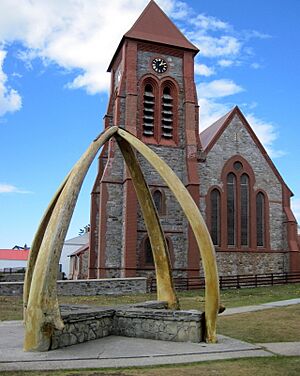
The community center is a great spot for activities. It has the only public swimming pool on the islands and a sports center. There is also a school here. A grass football field is right next to the community center. Another building holds the college for further education and the library. A new sports center is being built with a floodlit all-weather field.
Sports and Healthcare
Stanley Racecourse is on the west side of town. It hosts a two-day horse racing event every year on December 26th and 27th. These Christmas races have been a tradition for over 100 years. Stanley Golf Course has 18 holes and a clubhouse. It is also located west of Stanley.
King Edward VII Memorial Hospital is the main hospital for the islands. It has doctors' offices, surgery rooms, an X-ray department, and emergency services.
The Port Stanley Airport handles flights within the islands. International flights for passengers fly from the RAF Mount Pleasant military airbase. Stanley is also home to the Falkland Islands Radio Station (FIRS) and the office for the weekly Penguin News newspaper.
Stanley's Past: A Brief History
The first capital of the Falkland Islands was Port Louis. This was north of where Stanley is now. Captains Francis Crozier and James Clark Ross helped Governor Richard Moody find a new capital. Both Crozier and Ross were famous sailors. They spent five months exploring the islands.
Governor Moody decided to move the capital to a place called Port Jackson. This place was renamed "Stanley Harbour." It was chosen because it had a deeper harbor for ships. Not everyone was happy with the move at first.
Work on the new settlement began in 1843. It officially became the capital in July 1845. The town was named after Lord Stanley. He was an important government official at the time. In 1849, 30 retired soldiers and their families moved there. They helped defend the islands and build the new town.
Stanley quickly grew into a busy port. At first, it was known for repairing ships. Before the Panama Canal was built, many ships traveling around South America stopped in Port Stanley for repairs. The rough seas often damaged ships. Later, Stanley became a base for whaling and sealing in the South Atlantic.
It also became an important place for the Royal Navy to refuel their ships with coal. Because of this, ships based here were involved in important naval battles. These included the Battle of the Falkland Islands in World War I and the Battle of the River Plate in World War II.
Challenges and Changes
In 1879 and 1886, parts of the town were damaged by landslides. These were caused by too much peat being cut. Two people died in the 1886 landslide. The town was even cut in half for a time, and people had to use boats to get around.
During the Second World War, a ship in Stanley Harbour was used to hold a British man named Jeffrey Hamm. He was arrested for sharing ideas that were not allowed at the time.
Flights to Argentina stopped after the 1982 conflict. Now, a weekly flight to Punta Arenas in Chile operates from RAF Mount Pleasant. There are also regular passenger flights between Mount Pleasant and the UK twice a week.
The Falklands War and Beyond
Stanley was taken over by Argentine troops for about 10 weeks during the Falklands War in 1982. The Argentinians renamed the town Puerto Argentino. Many islanders find this name offensive. Stanley was damaged during the war. After British forces took control of the high ground around the town, the Argentinians surrendered. The areas around the town were heavily mined. Some of these areas are still marked as minefields today.
Since the Falklands War, Stanley has grown a lot. The fishing and tourism industries have become very important. Many new homes have been built, especially east of the town center. Stanley is now more than a third bigger than it was in 1982.
In 2022, Stanley was given city status as part of Queen Elizabeth II's Platinum Jubilee celebrations. This also marked 40 years since the invasion and liberation of the port. The Governor of the Falkland Islands, Nigel Phillips, officially announced it on June 14, 2022.
Why is it Called Stanley?
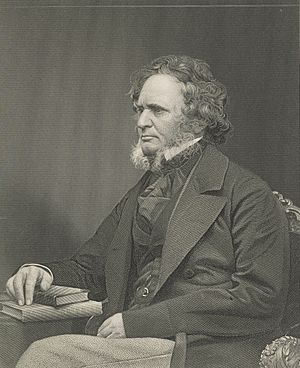
The city has been called by different names in English and Spanish. The harbor was first known as "Port Jackson." The town is officially "Stanley," but people often call it "Port Stanley." This is similar to other places on the islands like Port Howard.
However, the name "Stanley" without "Port" was used long before the war. In 1956, officials decided that "Stanley" was the correct and most common name for the capital.
Spanish and Argentine Names
Stanley was a new town built by the British, so it didn't have an old Spanish name. Many Spanish speakers use "Puerto Stanley." However, people who support Argentina's claim to the islands do not like English names. They have used different names for the city:
- Puerto Soledad: This was an old Spanish name for the former capital, Port Louis, not Stanley.
- Puerto Rivero: Named after Antonio Rivero, an Argentine figure. This name was used by some groups and during the early days of the 1982 invasion.
- Puerto de la Isla Soledad: A variation of Puerto Soledad.
- Puerto de las Islas Malvinas: Meaning "Port of the Malvinas/Falklands."
- Puerto Argentino: Meaning "Port Argentine." This name has been used by Argentinians since April 21, 1982.
During the 1982 occupation, a radio reporter named Patrick Watts tried to avoid using the Argentine names. He would call it "the capital" or "the largest settlement on the island."
Stanley's Climate: What's the Weather Like?
Stanley has a cool, subpolar oceanic climate. This means it's often chilly, but not extremely cold like a polar climate. The winters are quite mild, and plants can grow there.
The Falkland Islands have been getting a bit warmer in recent years. Stanley gets about 544 millimeters (21 inches) of rain each year. This rain is spread out evenly throughout the year. It usually rains on about 125 days a year.
The islands get a good amount of sunshine, similar to southern parts of England. Daytime temperatures are like those in northern Scotland. Nights can be colder, with frost happening on more than one-third of nights. Snow can fall in winter, and light snow can happen any time of year.
Stanley is about the same distance from the equator as cities like London. This shows how cool the climate is, even though it's not as far north as some very cold places. The nearest larger city, Río Gallegos in Argentina, is a bit milder.
The temperature in Stanley has ranged from as low as -11.1°C (12°F) to as high as 26.1°C (79°F).
Education in Stanley
The Stanley Infant & Junior School (IJS) is for younger students. It is located on John Street. The school opened in 1955 and has about 250 students aged four to 11.
The Falkland Island Community School (FICS) is for older students. It is on Reservoir Road in Stanley. This school has about 220 students aged 11 to 16.
More About Stanley
Nearby places to visit include Gypsy Cove and Cape Pembroke. Gypsy Cove is famous for its Magellanic penguins. Cape Pembroke is the easternmost point of the Falklands. Gypsy Cove is about 6 kilometers (4 miles) from Stanley. You can get there by taxi or by walking.
Today, about one-third of the people in Stanley work for the government. Tourism is also a very important job source. When many large cruise ships visit, there can be more tourists in town than local residents!
In the past, peat was a common way to heat homes in Stanley. You can still see stacks of drying peat near some houses.
Stanley has "twin town" relationships with two towns in the United Kingdom: Whitby in North Yorkshire and Airdrie in North Lanarkshire.
Notable People from Stanley
Many interesting people have connections to Stanley:
- George Rennie (1801/1802–1860): A sculptor and politician who was also a governor.
- Mary Ellaline Terriss, Lady Hicks (1871–1971): A popular English actress and singer.
- Edward Binnie (1884–1956): The second leader of South Georgia.
- McDonald Hobley (1917–1987): One of the first TV announcers for the BBC.
- Sir Rex Hunt (1926–2012): The Governor during the Falklands War.
- Gerald Reive (born 1937): A New Zealand athlete in lawn bowling.
- Terry Peck (1938–2006): A soldier, policeman, and legislator.
- Edward Neill "Ted" Baker (born 1942): A New Zealand scientist.
- Alejandro Betts (1947–2020): A Falklands-born air-traffic controller who supported Argentina's claim.
- Mensun Bound (born 1953): A British marine archaeologist.
- James Peck (born 1968): An artist and writer.
Modern-day Politicians
- Janet Lynda Cheek (born 1948): A politician who served in the Legislative Assembly.
- Mike Summers (born 1952): A politician who served in the Legislative Assembly.
- Sharon Halford (born 1953): A politician who served in the Legislative Assembly.
- Glenn Ross (born 1964): An engineer and politician.
- Michael Poole (born 1984): A politician who served in the Legislative Assembly.
- Gavin Short (born 1962): A politician who served in the Legislative Assembly and is now a news reporter.
Images for kids
See also
 In Spanish: Puerto Argentino/Stanley para niños
In Spanish: Puerto Argentino/Stanley para niños
 | May Edward Chinn |
 | Rebecca Cole |
 | Alexa Canady |
 | Dorothy Lavinia Brown |


